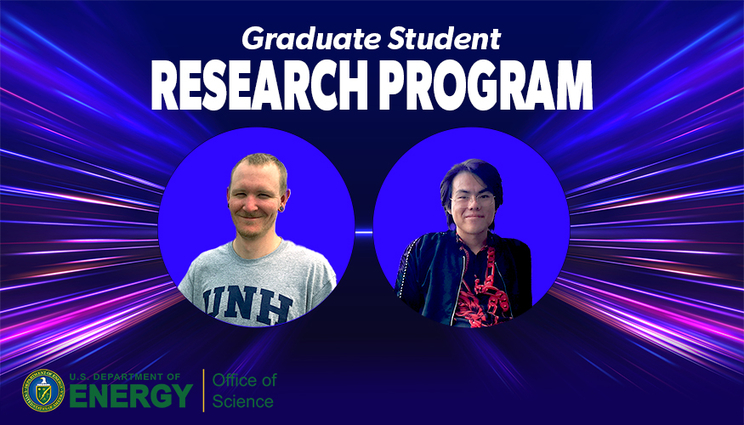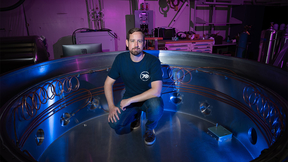Two selected as Graduate Student Research program recipients
 (Download Image)
(Download Image)
Sean Schaefer and Jianyang Qi are the next round of Office of Science Student Research Program recipients coming to Lawrence Livermore National Laboratory in 2024.
Two graduate students have earned Department of Energy (DOE) Office of Science Graduate Student Research (SCGSR) Program awards to perform their doctoral dissertation research at Lawrence Livermore National Laboratory (LLNL). The prestigious award helps cover living expenses and travel for 60 students from universities across the nation. Their proposed research projects address scientific challenges central to Office of Science mission areas from nuclear physics to environmental systems.
“This is an incredible experience for students – being able to conduct research at a national laboratory will have far reaching impacts,” said Asmeret Asefaw Berhe, director of the DOE Office of Science. “We hope that these students will continue their path in science and I look forward to seeing what they do in the future.”
Jianyang Qi from the University of California, San Diego and Sean Schaefer of the University of New Hampshire will arrive at the Laboratory in 2024 to begin their fellowships.
Through world-class training and access to state-of-the-art facilities and resources at DOE national laboratories, SCGSR prepares graduate students to enter jobs of critical importance to the DOE mission and secures the national position at the forefront of discovery and innovation.
Jianyang Qi
Under the direction of staff scientist Jingke Xu, Qi will work in detector development in high-energy physics.
“I feel that this award gives me the opportunity to focus on my love of studying novel detectors and doing measurements with them," Qi said. “I am excited to work with some of my friends and colleagues at LLNL for a year.”
With a major in experimental particle physics, Qi hopes to help develop a new type of low-energy particle detector and to make some novel measurements with an experienced group of detector physicists.
Xu said he is excited to have a student on board.
“This fellowship is a great opportunity to pair talented graduate students with cutting-edge science projects taking place at LLNL,” he said. “I am excited to host Jianyang in my research group for the next year, and I feel confident that we will be able to significantly advance the development of xenon-doped argon detectors for both dark matter searches and reactor neutrino detection.”
Sean Schaefer
As a student majoring in microbial ecology and biogeochemistry, Schaefer will be working under the direction of staff scientist Steven Blazewicz in environmental microbiology.
“I feel very grateful and determined to have gotten an SCGSR award,” Schaefer said. “It has been something that has been on my radar since starting my Ph.D. and it is an amazing feeling to see my hard work turn an ambition into a reality.”
Schaefer studies how microbial communities in the soil are responding to changing tundra landscapes and what this means for global carbon cycles and climate security. His research path has led him to examine how different tundra plants influence root-associated microbial communities, and how these communities influence the amount of carbon in the soil that gets decomposed and released into the atmosphere as greenhouse gases.
During his fellowship, Schaefer hopes to “gain skills and connections that will further my dissertation and career.” Specifically, he is excited to learn about the automated high-throughput stable isotope probing (HT-SIP) pipeline.
Blazewicz said he’s looking forward to mentoring Schaefer. “It’s a chance to contribute to the growth and development of an aspiring scientist, and Sean’s research is important and timely.”
Blazewicz said Schaefer's work will help to enhance the group’s mechanistic understanding of how rhizosphere and permafrost microbial community interactions influence belowground carbon dynamics.
This year’s 60 awardees were selected from a diverse pool of graduate applicants from institutions around the country. Selection was based on merit peer review by external scientific experts with supplemental funds to conduct part of their thesis research at a host DOE laboratory in collaboration with a DOE laboratory scientist.
SCGSR awardees work on research projects of significant importance to the Office of Science mission that address critical energy, environmental and nuclear challenges at national and international scales.
See the full list of awardees.
Contact
 Anne M. Stark
Anne M. Stark
[email protected]
(925) 422-9799
Related Links
Department of Energy Office of Science Graduate Student Research (SCGSR) ProgramFull List of Awardees
Tags
Bioscience and BioengineeringBiosciences and Biotechnology
Nuclear, Chem, and Isotopic S&T
Nuclear and Chemical Sciences
Academic Engagement
Students
Physical and Life Sciences
Science
Community Outreach
Featured Articles







